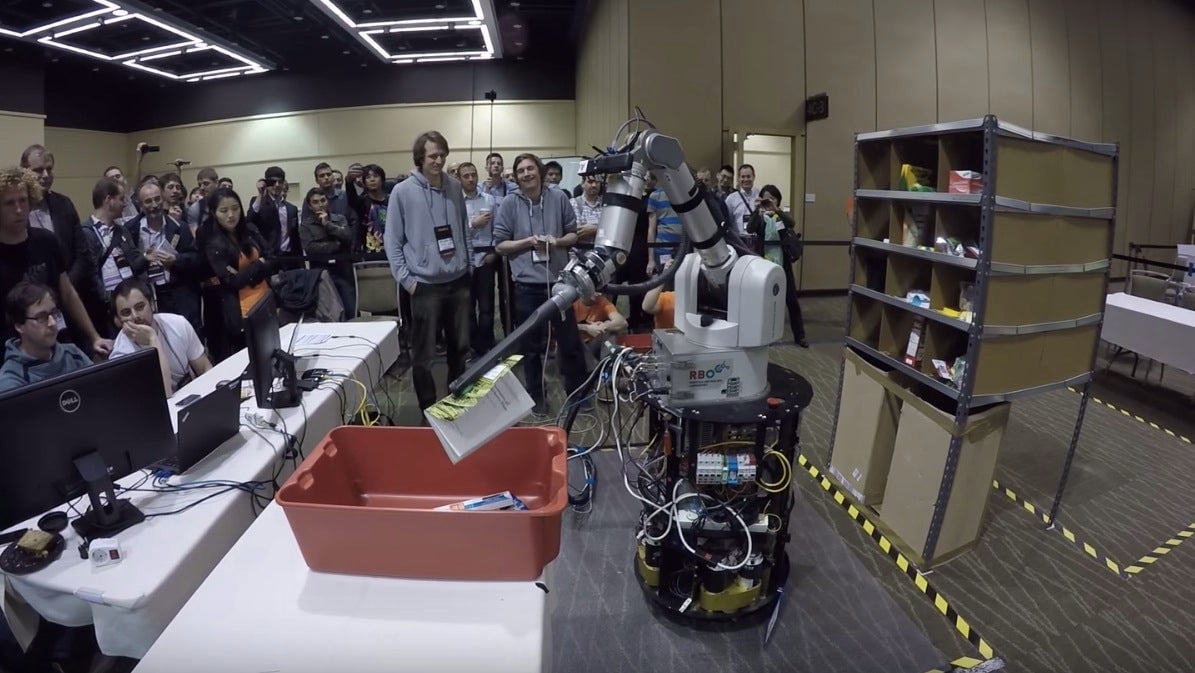Amazon tests out robots that might one day replace warehouse workers
We humans often get injured or sick, and can’t usually work round the clock. We also sometimes have families and enjoy healthcare. Robots, on the other hand, have none of these problems.


We humans often get injured or sick, and can’t usually work round the clock. We also sometimes have families and enjoy healthcare. Robots, on the other hand, have none of these problems.
Which is why Amazon hosted a competition over the weekend to find out if a robot could take the jobs of any of its many employees—more than 50,000 people work in its US warehouses alone—who fulfil our insatiable desires for books, toasters, cameras, and live ladybugs.
The Amazon Picking Challenge, hosted during a robotics conference in Seattle last week, tested a robot’s ability to autonomously grab items from a shelf and place them in a tub. While we have robots that can be programmed to pick things up and put them other places—Rethink Robotics’ Baxter is great at this—it’s much harder to get them to recognize millions of items of different shapes, colors, and sizes on their own.
This requires techniques like computer vision—a method for training computers to understand the context of what they see—as well as really nimble grabbing instruments to pick up all the differently-sized items. Competition judges awarded points for successful picks, and deducted points for dropped or damaged items.
Amazon built a shelf and filled it with a range of everyday items it sells—including Oreos, Cheez-Its, spark plugs, dog treats, and of course, a few books—to test out the challengers’ picking potential. According to Engadget, Team RBO from the Technical University of Berlin absolutely dominated the competition. Out of 12 objects encountered, RBO’s robot was able to successfully pick ten. The robot—which looks like a cross between a Roomba, a welding arm, and a vacuum cleaner—received polite applause from the dozens of people in the audience after it successfully managed to deposit each item.
RBO won the competition with 148 points—along with $20,000 in prize money—while its closest competitor, a team from MIT, received 88 points.
Amazon already has more than 15,000 robots in its warehouses, according to the MIT Technology Review. These robots are made by Kiva Systems (which Amazon acquired in 2012) and are mainly used to ferry products around the warehouses; a human still needs to put the items in a tub to send them off for packaging.
Kiva’s chief technology officer Pete Wurman was on the organizing committee for this competition, and the shelves the robots were picking from were modeled on the ones that Kiva robots currently move around Amazon’s warehouses.
It’s unlikely, however, that RBO’s robot, or any other’s, will be fulfilling orders for Amazon any time soon. Amazon is actually hiring 6,000 more human workers for its fulfilment warehouses, as we keep wanting more things delivered to us. None of the robots were more effective, or even as effective, at identifying objects than humans and they’re also really, really slow. Somewhat ironically, the items that caused one team the most grief were the first things Amazon sold: thin paperback books.
But that doesn’t mean it won’t happen in the future. The next generation of robots will undoubtably be faster and more adept at identifying objects, whereas the next generation of humans will pretty much be as good as the current one.